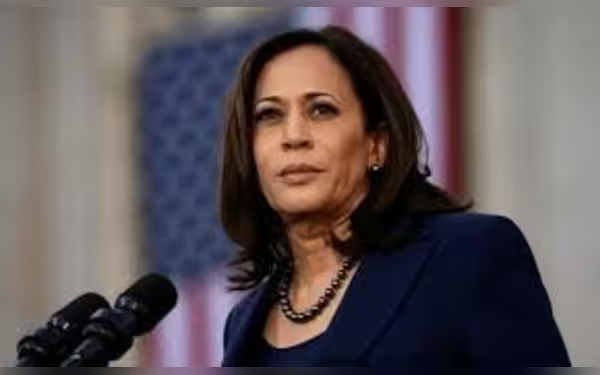Sunday, October 6, 2024 12:22 AM
Kamala Harris Faces Challenges with Muslim Voters Amid Gaza Conflict
- Harris seeks to regain trust of Muslim voters.
- Community leaders express disappointment over U.S. actions.
- Upcoming election heightens stakes for Harris.
 Image Credits: dawn
Image Credits: dawnKamala Harris aims to regain Muslim voter trust amid Gaza conflict, facing mixed responses from community leaders ahead of the presidential election.
In recent weeks, the political landscape in the United States has been significantly influenced by the ongoing conflict in Gaza. Vice President Kamala Harris is now facing the challenge of regaining the trust of American Muslim and Arab voters, who have expressed their discontent with the U.S. government's support for Israel. This situation has prompted Harris's team to engage with community leaders in an effort to address their concerns.
On Wednesday, Phil Gordon, Harris's national security adviser, held a virtual meeting with various American Muslim and Arab leaders. During this meeting, he emphasized that the Biden administration supports a ceasefire in Gaza, aims for diplomatic solutions in Lebanon, and seeks stability in the Israeli-occupied West Bank. However, the response from community leaders has been mixed. Ali Dagher, a Lebanese-American attorney, voiced his disappointment, stating, "It’s too little, too late." His remarks reflect a broader sentiment among many who feel that the administration's actions have not matched their words.
The political stakes are high for Harris, especially with the upcoming presidential election on November 5, where she will face off against former President Donald Trump. Polls indicate that the race is tight, and the support of Muslim voters, which was significant in the 2020 election, has dwindled. Many activists argue that both President Joe Biden and Harris have not done enough to halt Israel's military actions in Gaza, which have resulted in a severe humanitarian crisis affecting nearly all of the 2 million residents of the enclave.
As the conflict continues, the situation in Lebanon has also escalated, with over 1,900 people reported killed and 9,000 wounded due to ongoing cross-border fighting between Israel and Hezbollah. The recent surge in violence has raised alarms and intensified calls for action from the U.S. government.
In light of these developments, the Muslim American advocacy group Emgage has recently endorsed Harris, while others have urged their supporters to distance themselves from her campaign. This division within the community could have significant implications for Harris's chances in the election. Analysts suggest that if Muslim voters choose to abstain from voting or support third-party candidates, it could negatively impact her campaign.
The U.S. support for Israel has sparked large protests, particularly in swing states like Michigan, which are crucial for determining the outcome of the election. As the election date approaches, Harris has yet to present any substantial policy differences regarding Israel compared to Biden, who had previously stepped aside as a presidential candidate.
The outreach efforts by Vice President Kamala Harris may be seen as a step in the right direction, but the skepticism from community leaders highlights the challenges she faces in winning back the trust of Muslim voters. As the political climate continues to evolve, it remains to be seen whether these efforts will translate into tangible support at the polls. The situation serves as a reminder of the complex interplay between foreign policy and domestic voter sentiment, underscoring the importance of addressing community concerns in a timely and effective manner.













